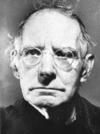- O'Casey, Sean
-
died Sept. 18, 1964, Torquay, Devon, Eng.Irish playwright.Born to a poor Protestant family, he educated himself and worked from age 14 at manual labour. He embraced the Irish nationalist cause, changed his name to its Irish form, and became active in the labour movement and its paramilitary Irish Citizen Army. By 1915 he had turned from politics to writing realistic tragicomedies about Dublin slum dwellers in war and revolution. The Abbey Theatre produced three of his earliest and best playswhich caused riots by Irish patriots. When his antiwar play The Silver Tassie was rejected by the Abbey, O'Casey moved to England, where it was produced in 1929. His later plays include Red Roses for Me (1946); he also published a six-volume autobiography (1939–56).
 O'Casey, photograph by J. BownCamera Press
O'Casey, photograph by J. BownCamera Press* * *
▪ Irish dramatistoriginal name John Caseyborn March 30, 1880, Dublin, Ire.died Sept. 18, 1964, Torquay, Devon, Eng.Irish playwright renowned for realistic dramas of the Dublin slums in war and revolution, in which tragedy and comedy are juxtaposed in a way new to the theatre of his time.O'Casey was born into a lower middle-class Irish Protestant family. His father died when John was six, and thereafter the family became progressively poorer. With only three years of formal schooling, he educated himself by reading. He started work at 14, mostly at manual labour, including several years with the Irish railways. (O'Casey would later exaggerate the hardships and poverty he had experienced during childhood.)O'Casey became caught up in the cause of Irish nationalism, and he changed his name to its Irish form and learned Gaelic. His attitudes were greatly influenced by the poverty and squalor he witnessed in Dublin's slums and by the teachings of the Irish labour leader Jim Larkin. O'Casey became active in the labour movement and wrote for the Irish Worker. He also joined the Irish Citizen Army, a paramilitary arm of the Irish labour unions, and drew up its constitution in 1914. At this time he became disillusioned with the Irish nationalist movement because its leaders put nationalist ideals before socialist ones. O'Casey did not take part in the 1916 Easter Rising against the British authorities.Disgusted with the existing political parties, he turned his energies to drama. His tragicomedies reflect in part his mixed feelings about his fellow slum dwellers, seeing them as incapable of giving a socialist direction to the Irish cause but at the same time admirable for their unconquerable spirit.After several of his plays had been rejected, the Abbey Theatre in Dublin produced The Shadow of a Gunman (1923), set during the guerrilla strife between the Irish Republican Army and British forces. In 1924 the Abbey staged Juno and the Paycock, his most popular play, set during the period of civil war over the terms of Irish independence. The Plough and the Stars (1926), with the 1916 Easter Rising as its background, caused riots at the Abbey by patriots who thought the play denigrated Irish heroes. When first produced in the 1920s, these plays had an explosive effect on the audiences at the Abbey and helped to enlarge that theatre's reputation.O'Casey went to England in 1926, met the Irish actress Eileen Carey Reynolds, married her, and henceforth made England his home. His decision to live outside Ireland was motivated in part by the Abbey's rejection of The Silver Tassie, a partly Expressionist antiwar drama produced in England in 1929. Another Expressionist play, Within the Gates (1934), followed, in which the modern world is symbolized by the happenings in a public park. The Star Turns Red (1940) is an antifascist play, and the semiautobiographical Red Roses for Me (1946) is set in Dublin at the time of the Irish railways strike of 1911.His later plays, given to fantasy and ritual and directed against the life-denying puritanism he thought had beset Ireland, include Cock-a-Doodle Dandy (1949), The Bishop's Bonfire (1955), and The Drums of Father Ned (1958). His last full-length play was a satire on Dublin intellectuals, Behind the Green Curtains (published 1961).O'Casey's three indisputably great plays are The Shadow of a Gunman, Juno and the Paycock, and The Plough and the Stars. All are tragicomedies set in the slums of Dublin during times of war and revolution. Violent death and the everyday realities of tenement life throw into relief the blustering rhetoric and patriotic swagger of men caught up in the struggle for Irish independence. The resulting ironic juxtapositions of the comic and tragic reveal the waste of war and the corrosive effects of poverty. O'Casey's gifts were for vivid characterization and working-class language, and, though he portrayed war and poverty, he wrote some of the funniest scenes in modern drama. O'Casey's later plays are not considered as powerful or moving as his earlier realistic plays. In his later plays he tended to abandon vigorous characterization in favour of expressionism and symbolism, and sometimes the drama is marred by didacticism.Six volumes of O'Casey's autobiography appeared from 1939 to 1956; they were later collected as Mirror in My House (1956) in the United States and as Autobiographies (1963) in Great Britain. O'Casey's letters from 1910 to 1941 were edited by David Krause in two volumes (1975, 1980).Additional ReadingC. Desmond Greaves, Sean O'Casey: Politics and Art (1979), traces O'Casey's social thought. Garry O'Connor, Sean O'Casey: A Life (1988), is a corrective on biographical points.* * *
Universalium. 2010.
